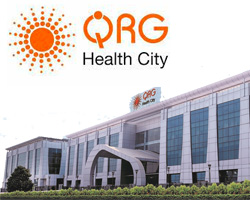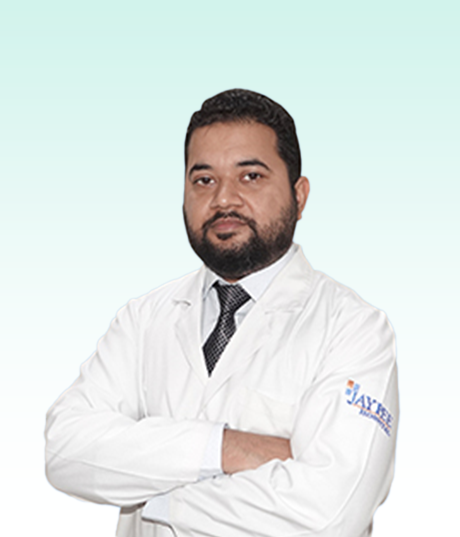Thyroidectomy
Thyroidectomy is a surgical procedure performed to remove all or a portion of the thyroid gland. The thyroid gland, located in the neck, plays a crucial role in regulating the body’s metabolism by producing thyroid hormones. This surgery is typically recommended to treat various thyroid conditions, including thyroid cancer, hyperthyroidism (overactive thyroid), goiter (enlarged thyroid), or when nodules on the thyroid gland raise concerns about cancer.

Who Needs Thyroidectomy
Thyroidectomy may be recommended for individuals who have:
Thyroid Cancer: A diagnosis of thyroid cancer, where the surgical removal of the affected thyroid tissue is part of the treatment plan.
Hyperthyroidism: An overactive thyroid gland that does not respond to medication or other treatments, and surgery is required to reduce hormone production.
Goiter: An enlarged thyroid gland causing difficulty swallowing, breathing, or cosmetic concerns.
Thyroid Nodules: Suspicious or large thyroid nodules that may be cancerous or causing other health issues.
When to See a Specialist
If you have symptoms of thyroid dysfunction, thyroid nodules, or a family history of thyroid conditions, it’s crucial to consult an endocrinologist or an ear, nose, and throat (ENT) specialist. They can conduct the necessary tests, including thyroid function tests and imaging, to diagnose the condition and determine if thyroidectomy is the appropriate treatment.
Procedure
Anesthesia: Thyroidectomy is typically performed under general anesthesia, rendering the patient unconscious during the surgery.
Incision: The surgeon makes an incision in the neck, either in a transverse (across the neck) or vertical (midline) fashion, depending on the extent of thyroid removal.
Thyroid Dissection: The surgeon carefully dissects the thyroid gland from the surrounding tissues and identifies critical structures such as the recurrent laryngeal nerves and the parathyroid glands, which regulate calcium levels in the body.
Thyroid Removal: Depending on the reason for the surgery, either a portion (subtotal thyroidectomy) or the entire thyroid gland (total thyroidectomy) is removed. The type of surgery performed depends on the underlying condition and the surgeon’s judgment.
Closure: After thyroid removal, the surgeon closes the incision with sutures, and a sterile dressing is applied.
Road To Recovery
Recovery from thyroidectomy includes:
Hospital Stay: Most patients can leave the hospital within a day or two after the surgery, although more extensive surgeries may require a longer stay.
Medications: Thyroid hormone replacement therapy is often prescribed to replace the missing thyroid hormones after a total thyroidectomy.
Voice and Calcium Monitoring: Monitoring for potential voice changes and calcium level fluctuations, which can occur due to damage to the vocal cords or parathyroid glands during surgery.
Follow-up Appointments: Regular follow-up visits with the surgeon to monitor healing, thyroid hormone levels, and any potential complications.
Risk Management
While thyroidectomy is generally safe, it carries potential risks, including:
Voice Changes: Damage to the recurrent laryngeal nerve during surgery can lead to voice changes, although this is usually temporary.
Hypoparathyroidism: A decrease in parathyroid function can result in low calcium levels, which may require calcium and vitamin D supplements.
Bleeding or Infection: Proper wound care and antibiotics can help prevent these complications.
Benefits of Thyroidectomy
The benefits of thyroidectomy include:
Treatment of Thyroid Cancer: For individuals with thyroid cancer, thyroidectomy is a crucial step in the treatment process.
Resolution of Hyperthyroidism: Surgery can effectively treat hyperthyroidism when other treatments have failed.
Goiter Reduction: Thyroidectomy can alleviate symptoms associated with an enlarged thyroid gland.
Diagnostic Value: Thyroidectomy allows for the examination of the removed tissue, aiding in the diagnosis of thyroid conditions.
Frequently Asked Questions
Will I need to take thyroid hormone medication after thyroidectomy?
If the entire thyroid gland is removed, thyroid hormone replacement therapy is typically necessary for life to maintain normal metabolism.
Can thyroidectomy cure thyroid cancer?
Thyroidectomy is a critical component of thyroid cancer treatment, but additional treatments like radioactive iodine therapy may be required based on the specific type and stage of cancer.
How long is the recovery period after thyroidectomy?
Recovery times vary, but many patients can resume normal activities within a few weeks.
Will there be a visible scar after thyroidectomy?
The appearance of the scar depends on the type of incision used, but it typically heals well and becomes less noticeable over time.
Is thyroidectomy a major surgery?
Thyroidectomy is considered a major surgery due to its impact on thyroid function and the potential risks involved. However, it is a common and safe procedure when performed by experienced surgeons.
Treatment Plans
- Trauma & intensive care $59
- Aged Care $29
- Community Services $25
- Diagnosis & Investigation $48
- Medical & Surgical $82
- Mental Health $74
- Rehabitation $24
- Specialised Support Service $19
- Trauma & intensive care $59
- Aged Care $29
- Community Services $25
- Diagnosis & Investigation $48
- Medical & Surgical $82
- Mental Health $74
- Rehabitation $24
- Specialised Support Service $19
Treatians As The Best Choice
Treatians understand that seeking medical treatment abroad can be a daunting experience for patients and their families. That’s why the company offers end-to-end support to its clients, from the initial consultation to post-treatment care. The company provides personalized treatment plans that are tailored to meet the individual needs of each patient, and its team of dedicated professionals is always on hand to provide guidance and support throughout the entire process. Contact us at +91-7982312582, drop your email [email protected]
- Trauma & intensive care
- Aged Care
- Community Services
- Diagnosis & Investigation
- Medical & Surgical
- Mental Health
- Rehabitation
- Specialised Support Service
Service Recipient Says

Oxmox advised her not to do so, because there were thousands of bad Commas, wild Question Marks and devious.
Kolis Muller NY Citizen
Oxmox advised her not to do so, because there were thousands of bad Commas, wild Question Marks and devious.
Kolis Muller NY Citizen



















Oxmox advised her not to do so, because there were thousands of bad Commas, wild Question Marks and devious.
Kolis Muller NY Citizen